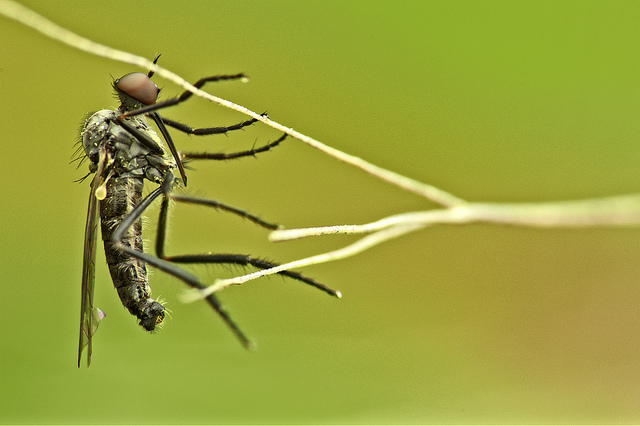The mosquito genome
Interview with
Every year millions of people are infected with malaria, which is spread by  mosquitoes. But despite the fact that there are hundreds of mosquito species that "could" spread the disease, only a small number actually do. If scientists can work out why, it should become much easier to control the mosquitoes - and the disease.
mosquitoes. But despite the fact that there are hundreds of mosquito species that "could" spread the disease, only a small number actually do. If scientists can work out why, it should become much easier to control the mosquitoes - and the disease.
To do this, Mara Lawniczak, has sequenced the DNA codes of a selection of mosquito species collected from across the world, as she explained to Chris Smith...
Mara - I was visiting a friend who I hadn't seen in many years and he happens to now be an actor although I met him at a biology camp in high school. He is typically in this Wes Anderson films and we were walking around New York City and we bumped into Wes Anderson who was having lunch with his mother and his brother. My friend introduced me to Wes Anderson and his family. They politely asked me what I do and I explained that I work on mosquitoes and trying to understand why mosquitoes transmit malaria. Wes Anderson's mother told me that in Illinois when she was a child, she actually had malaria and I was quite shocked because even though I work on the system, I had never met anyone in the states who actually had malaria while in the States.
Chris - Is that something which was more common historically and now, isn't?
Mara - Yes. Malaria has been reduced in many places in the world largely because of control of mosquitoes. So, for example in the States and I think in Britain as well, wetlands have been greatly reduced. So, that reduces the ability for mosquitoes to find the breeding sites that they need.
Chris - What sorts of mosquitoes transmit malaria? Can any mosquito do that or are there unique species that appear to be able to do it?
Mara - In terms of human malaria, only the genus Anopheles mosquitoes can transmit malaria. Even among Anopheles mosquitoes, there's a lot of variation for whether a particular species is actually transmitting the parasite or not. Even within a species, there's variation, so it's very complex.
Chris - How many different Anopheles species are there then?
Mara - More than 500 across the globe.
Chris - And the number that can transmit malaria out of that?
Mara - Quite a few can transmit, but in terms of actually having, really transmitting and causing disease and death, about 40.
Chris - So actually, a relatively restricted subset of the total. What you're trying to do is try to understand what's special about those ones that means they do transmit this disease compared with the ones that don't?
Mara - Well, there are a lot of questions around this. So, does it relate to how the mosquitoes smell or detect what they're going to take their blood meals from. Many different species bite all sorts of different creatures. So, what makes a mosquito prefer to bite humans? The only way we can ask these sorts of questions is to be able to really get into the genetics of it.
Chris - In other words, do the equivalent for mosquito that we've done for the human and do a human genome project but on a mosquito.
Mara - That's right. We selected 16 different Anopheles species which are quite distantly related from each other in some cases and which span the globe. They're in Asia, they're in Africa, they're in Europe, they're in South America. We've now created good accessible genomes so that researchers can now ask these sorts of questions.
Chris - Did people have to sort of send you in a squashed mosquito in a tube to sequence? How did you do that?
Mara - Yeah, that's exactly right. So, people went out to the field at some point and they collected some mosquitoes and sent off squashed mosquitoes. DNA was extracted from these mosquitoes and sequenced.
Chris - So, you read the DNA message and I suppose, what you can then do is to say, "Well, look. This group all convey malaria and they all have these consistent things in their DNA - perhaps the things that make them good transmitters of malaria lie in that region of the genome."
Mara - That's right. We can't really ask that question with this data yet, but that's one of the main interests of the community.
Chris - What else have you learned by comparing these different genomes and these different strains of mosquitoes?
Mara - There are two groups that are majorly responsible for like the vast majority of malaria transmission in Africa. What we found is that these two are actually the most distantly related. Yet, they've managed to interbreed. So, what we want to know is whether that has enhanced their ability to become major vectors.
- Previous Brain worm!
- Next Are we contaminating space?










Comments
Add a comment